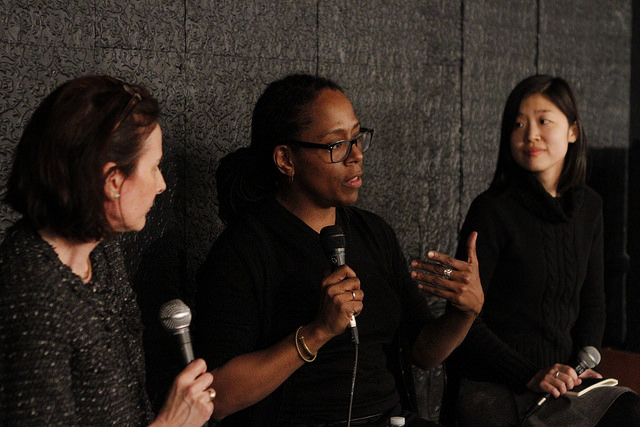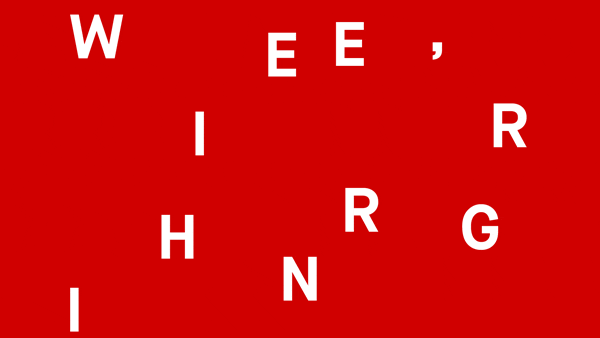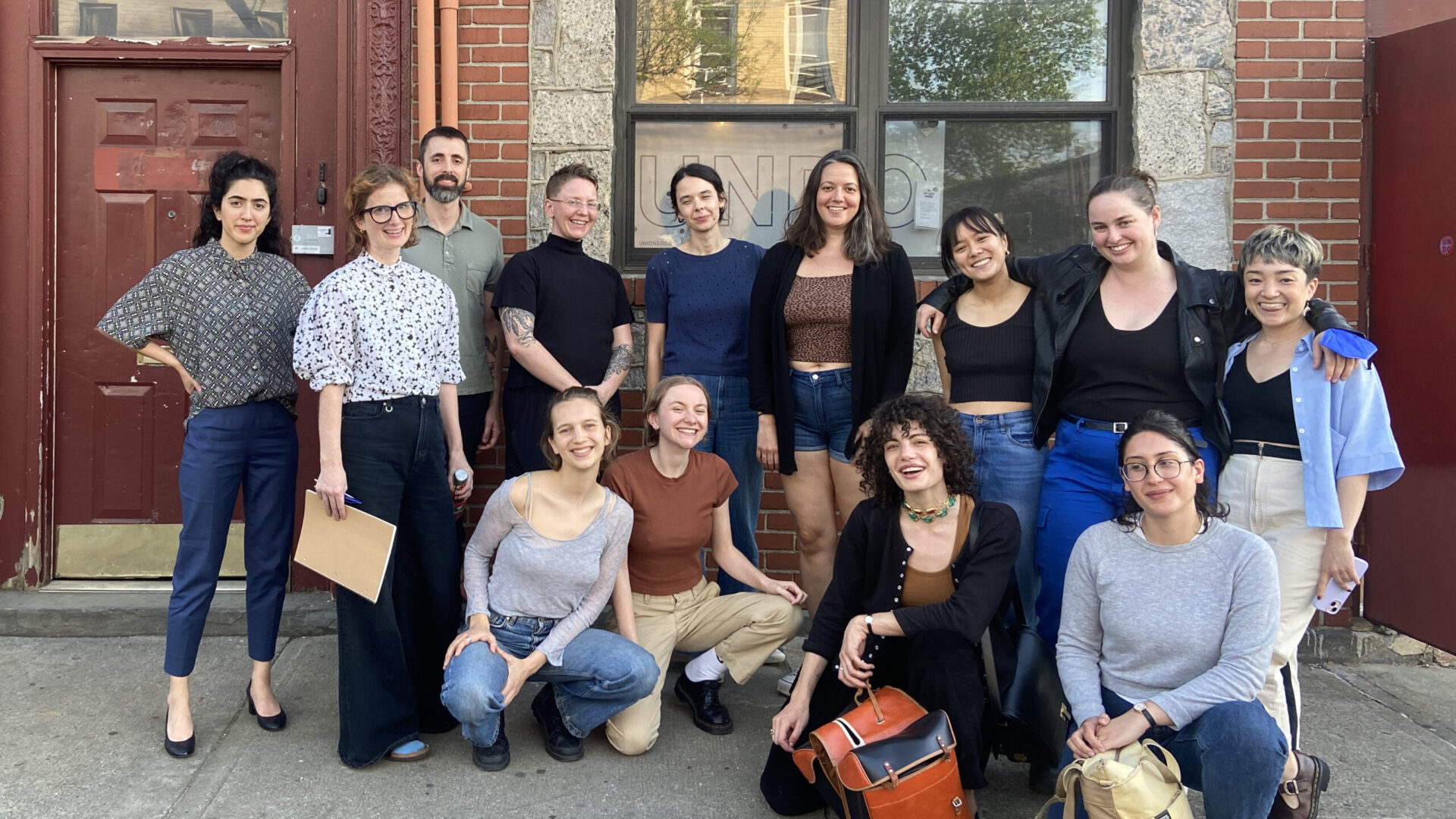RG: He definitely thought it was important. That’s why, all day today, I’ve been wondering why we didn’t donate them in 1975. Why did we keep them like that? I think I know, it’s part of keeping family secrets or something. You know, the heart of the family that we didn’t share. When my mother died, she left me this cross from Mexico. When my father died, I got the tapes. These were the things that were really important to them.
LP: Regan, do you have siblings?
RG: I had a brother, but he died. He had tried to put a lot of my dad’s material on tape cassettes. My dad, of course, would tape over those. It’s a miracle that they’re still here. These things could’ve very easily gotten lost. I do think a lot about the other ephemera that has gotten lost. But I like to think about loss.
Audience Member 8: A couple of questions. And, thank you, all of you. I wanted to ask about the use of the word trace. When I saw the announcement, maybe just this morning, I thought, ‘the Klan, who really thinks about that?’ More importantly, ‘who cares?’ It’s horrible stuff that exists as the under-belly of us. But, then again, how do we engage in a dialogue if we’re ignoring this other side? You really got me thinking about that. I was wondering about trace and responsibility. I think, in the beginning, you described trace as being part of education for the future?
LP: Yeah, I think that came from Thomas Keenan’s quote. I’ll look up the exact wording, “the event that is documented does not fully coincide with itself or it is doubled as an exemplum. It constitutes a trace, which is pedagogically oriented toward the future.”
Audience Member 9: So how are you understanding trace? I’m part of a national organization called Coming to the Table. It’s about the families of former slaves and former slaveholders getting together now. Two people in the organization wrote a book called Traces of the Trade. So, now I’m really thinking about this word.
LP: A read a lot of books, on various topics, that included the word trace. For me, it was the metaphoric potential embedded in the word that attracted me to it. The title is ‘Traces in the Dark’ and the question I asked about ‘invisible ubiquity’ was a way for me to talk about the things that are so big that they’re impossible to see as a whole. For example, the pervasive state of inequality. It’s so ubiquitous, so massive, that it becomes invisible, right in front of us. When we look at something small, something we can scrutinize up close, it can potentially tell us something about the larger whole. That’s how I conceptualized the project.
Audience Member 9: Like a microscope?
LP: Yeah, like a case study, for instance. That’s what I’m looking for when I look at a trace. For example, this file that Deanna accidentally found opened up this entire project. Something that I see on the side of the road might bring me somewhere else. It’s a spark, a seed for conversation, a starting point.
DB: I’m trying to think of how to go at this. A trace, for me, brings up images of ghosts, crumbs on the ground. I don’t want to get too visual but it’s those sort of nearly-invisible things. Certainly ghosts. Precursors to things that exist in the present. The trace for me, when thinking about this Philadelphia show, and this body of work, is that there’s a history. There are other iterations of the things we’re thinking about now. I guess that’s where I’d take it. The society we live in is a variation of the last generation’s, and that of the generation before. Something in that realm, I guess. I wouldn’t necessarily call the documents that I’ve come across traces. They are tangible, they are real, they aren’t derivative of something. Those are real things that I think are terribly obvious, I guess. I wouldn’t put them in the realm with ghosts and things like that.
LP: I want to add, though, that those tangible things carry traces. I think it’s a fascinating thing. The tapes that you materially describe, they are traces. Traces of your father and of everyone else who’s touched them.
RG: Lotta DNA on those tape boxes.
DB: That is true.
RG: Trace DNA . . .
DB: Nicely done.
RG: Thank you.
LP: Before we wrap up, I wanted to give the final word to Regan. Regan, do you have any questions for Deanna, myself, or anyone here?
RG: This is my worst nightmare. I have a question for Deanna, because the tapes are so funky, I thought that the stuff at the end was from a recording my brother made. Was that song on the tape?
DB: That’s on the tape.
RG: That’s a trace of my brother then.
DB: For me that’s been a burning question. I had no idea why this was at the end of the piece. I assumed it was a freak recording of a hotel room in the south, so that’s what I recreated. I had no idea.
RG: Yeah, my brother was a musician. I think that’s Sean.
DB: Well, thank you.
RG: Thank you. I guess I’m still curious how you feel about him being a white journalist. I mean, the majority of journalists, at that time, would’ve been white. I know you’ve been reading his book. You know that he had tremendous guilt over that and was constantly aware of it. He constantly castigated himself for that, even for feeling sympathy and pity.
DB: It doesn’t matter to me. It’s someone that was genuinely engaged with the work. At the end of the day, it really doesn’t matter to me. We’ve been talking about the Monson Lodge tape. Some of you might know of it. It was an integration attempt at a swimming pool where they poured acid in the pool. The day after, they drained the pool and put in alligators. I think anybody who witness that is amazing. I don’t care what color they are, I really don’t. I admire that he had the inner fortitude to stay, and record it, and witness it, and speak to it. That’s what matters. I’m thankful that he had access. I’m sure he had a great deal of concern about that access, but I’m thankful that he took that position for as long as he could handle it. It’s fabulous, important work. It informs my work which is all about telling a different side of the story. It’s an important thing and I’m grateful for it.
RG: Thank you.
LP: Thank you. I also am very grateful that we had this opportunity. I am also grateful that we solved a great mystery tonight. Thank you all for coming.






